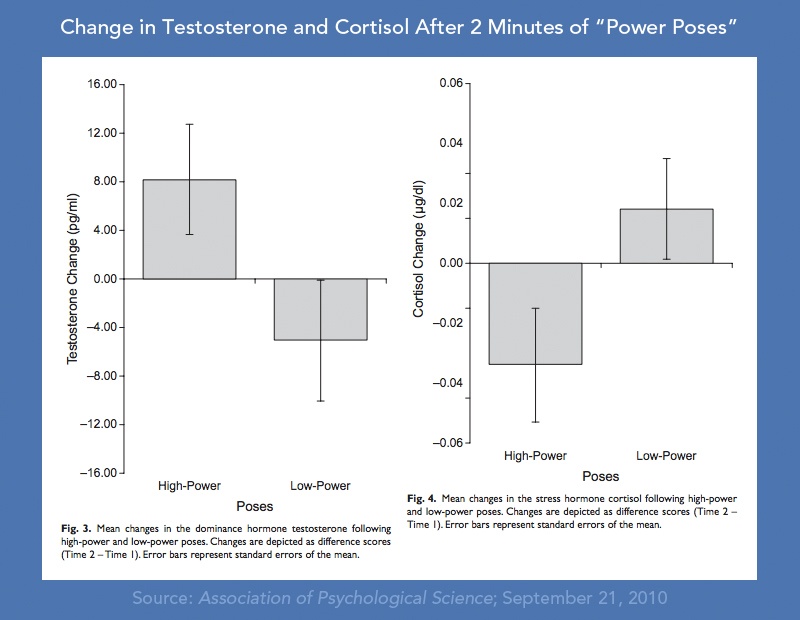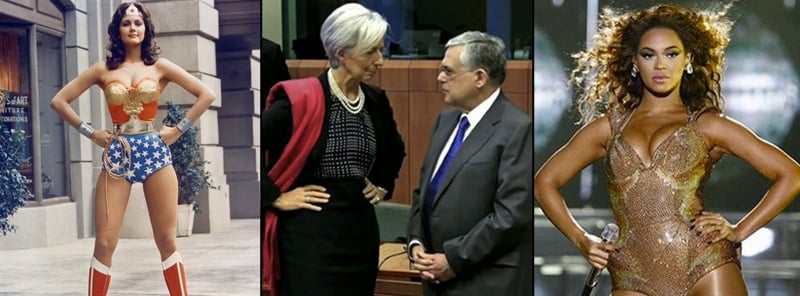The best part? It works immediately and only takes two minutes to do. Here’s the deal…
Your Hormones and Your Confidence
Recent research coming out of Harvard University, The University of Oregon, The University of Texas and many other places is revealing that powerful and effective leaders not only share similar mindsets, but also similar hormone levels. More specifically, powerful leaders tend to have higher levels of testosterone and lower levels of cortisol. Higher levels of testosterone (in both men and women) lead to increased feelings of confidence. Meanwhile, lower levels of cortisol lead to decreased anxiety and an improved ability to deal with stress. Here’s what that means: if you enjoy these hormone levels, then you are biologically primed to be more assertive, confident, and relaxed. At the same time, you will be less reactive to stress and more likely to handle pressure situations well. In other words, the correct hormone levels can make you feel more confident and less stressed. Sounds good, right? What is particularly important about testosterone and cortisol is that your levels of each hormone can change rapidly depending on the social, physical, and environmental cues that surround you.
What does this have to do with feeling more confident?
Well, it turns out that one of the physical cues that impacts these two hormones is body language. And if you understand how to improve your body language, then you can increase your testosterone, decrease your cortisol, and “magically” feel more confident and risk tolerant. Let’s talk about the link between body language and confidence…
Body Language: The “Power Poses”
Amy Cuddy is a researcher at Harvard University who studies body language and the impact it has on your hormones. Cuddy and her team have classified different body positions as “high power” or “low power” poses. In general, the high power poses are open and relaxed while the low power poses are closed and guarded. Below is an image showing the different types of power poses. Cuddy and her research team studied the impact of high power and low power poses by conducting a research study on 42 students. (Original article available here.) Here’s how the study went down…
First, a saliva sample was taken from each subject and their testosterone and cortisol levels were measured. Second, the subject was asked to sit in either a high power pose or a low power pose for two minutes. Third, a second sample of saliva was taken from each subject and their testosterone and cortisol levels were measured again.
When the researchers looked at the results, they were stunned by the impact that body language had on the hormones within the body. High power poses increased testosterone by 20 percent and decreased cortisol levels by 25 percent. Here’s a graph showing the results… This brings us to the most important question… How can you make this actionable in your life?
Stand Like This for 2 Minutes Per Day
The most well–known and versatile high power pose is nicknamed “The Wonder Woman” pose. You simple stand tall with your chest out and your hands on your hips. The images above show powerful women like Christine Lagarde and Beyonce in classic “Wonder Woman” pose. Just to be clear: despite the nickname and the photos, the impact of these poses is just as relevant to men as it is to women.
Making This Work in Real Life
If you’re aware of it, body language is easy to adjust throughout your day. But if you’re anything like me, you’ll get busy with other tasks and completely forget to check your body language. Because of this, I’ve found it most useful to insert a high power pose into my morning routine for 2 or 3 minutes and then move on with the rest of my life. Here’s a pattern that I have been playing with recently… Each morning, I’ll wake up and stand in a high power pose for two minutes. While I’m doing that, I’ll close my eyes, breathe in deeply for a count of 3, hold for 1, and then breathe out fully for a count of 5. In this way, I combine breathing exercises, meditation, and power poses for a relaxing and confidence–boosting start to the day. Plus, it only takes 120 seconds. It’s kind of hard to say you don’t have time for it. For more ideas on how to improve your morning routine, read this: 8 Ways to Improve Your Morning Routine
What You Should Do Now
Just to be clear: I don’t believe that body language is the end–all and be–all of becoming more confident. That said, it is pretty clear that confidence is a two–way street that involves both your mind and body. Sure, your personality and your emotional state will impact your confidence levels, but it’s obvious that assuming better body language, taking up space, and expanding your physical presence can play an important role as well. Most importantly, you now have another tool in your toolbox to use whenever you need it. If you’re feeling stressed a few minutes before your next presentation, interview, or meeting — take a moment to adjust your posture and stand in a powerful position. Put your hands on your hips, keep your chin up, and your chest out. Doing this for just two minutes will raise your testosterone and increase your confidence, while also decreasing your cortisol and improving your ability to handle stress. Your behaviors and emotions are firmly tied. The most powerful leaders don’t merely think a certain way, they carry themselves a certain way. You should do the same.
Watch Amy Cuddy’s 20–Minute TED Talk
Want more? You can watch Amy Cuddy talk about her research and the impact of body language in her 20–minute TED Talk. It’s well worth the time. This article was originally published on JamesClear.com. Featured photo credit: Nathan Rupert via flickr.com


